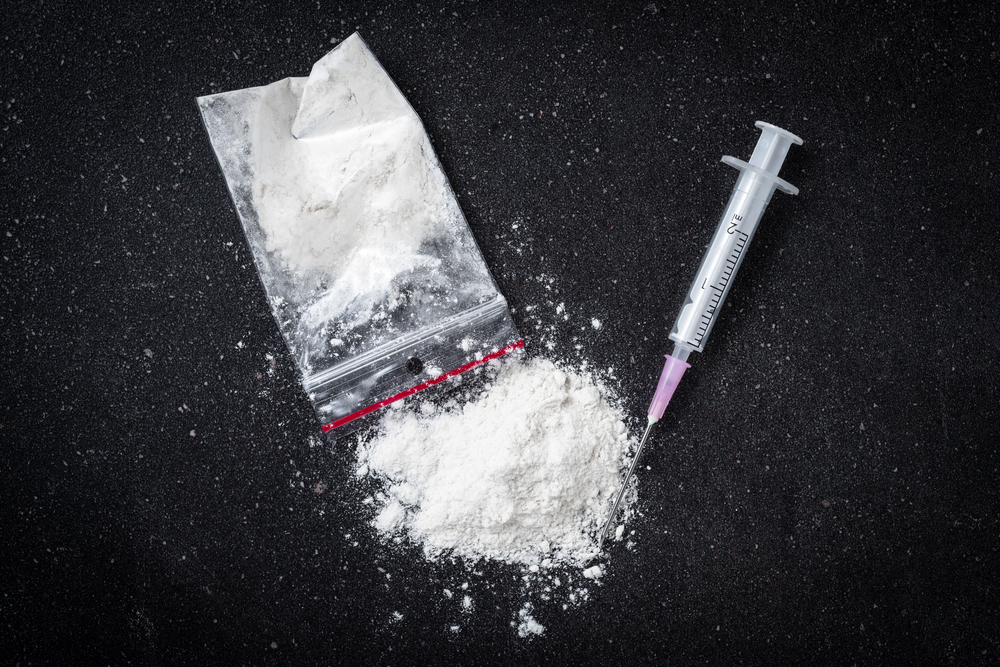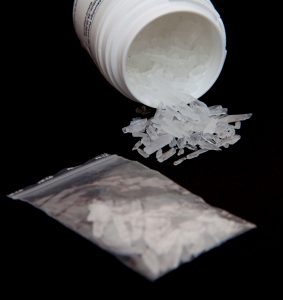
 Methamphetamine Addiction Treatment
Methamphetamine Addiction Treatment
At Restore Drug Rehab LA, we offer a full continuum of care and take an individualized approach to methamphetamine addiction treatment. We tailor treatment plans to fit the specific needs and unique circumstances of the client. Those who turn to us for help receive unending support, guidance, hope, and care. We are entirely committed to your success in treatment and sobriety maintenance in the many years that follow your stay with us.
Methamphetamine is a powerful stimulant drug that is commonly known as meth. One of the most popular formulations of methamphetamine is crystal meth, a widely abused drug in the United States. Methamphetamine is classified as a Schedule II drug under the Controlled Substances Act, meaning it has a high potential for abuse, which can lead to severe physical dependence and even psychological dependence.
If you are abusing any form of Methamphetamine, or are dependent on the drug, it is important to consider your options for Methamphetamine addiction treatment. It is incredibly difficult for most people to stop using the drug on their own, and professional help from a certified drug rehab facility will be needed. For a Methamphetamine drug treatment center that truly cares, call Restore Drug Treatment and speak with our addiction specialists about start your recovery today.
What is Methamphetamine?
Meth is an illegal drug that has a similar chemical makeup to the medications that treat attention-deficit hyperactivity disorder (ADHD). Prescription drugs for ADHD, such as Adderall, Ritalin, Concerta, and Vyvanse, are amphetamine-based drugs. Methamphetamine and Adderall are both central nervous system (CNS) stimulants and have virtually identical on a molecular level. However, there is just one chemical that sets these two drugs apart, N-methylamphetamine. The “methyl” included in the formula is what drastically enhances the effects and abuse potential of methamphetamine.
Methamphetamine is an illicit drug, though Desoxyn, an ADHD medication, is the only methamphetamine-based drug for medical use. Meth or crystal meth takes on many different forms, ranging in size, color, consistency, and purity. Today, the drug’s purpose is essentially for recreational use. It can be swallowed, snorted, smoked, and injected. Common street names for Methamphetamine include chalk, ice, crystal, crank, and glass, among many others. The methods of administration of the drug cause effects that are instantaneous but short lived. Because of this, a binge cycle often starts to take place, and the person uses the drug repeatedly over a short period of time.
When a person takes Methamphetamine, it quickly causes an increase in brain activity. The drug signals the brain to release an overflow of dopamine, which is a chemical that controls the reward system and is responsible for feelings of pleasure. This “rush” is what creates the euphoric effects associated with Methamphetamine use. These feelings, however, do not last long, with effects known to abruptly stop after a few short minutes. The user then experiences what is known as the “crash,” when dopamine levels drop. A person who suffers from methamphetamine dependency will continue to use the drug to achieve feelings of reward and pleasure because their brain becomes rewired and no longer knows how to produce dopamine without the drug. This often results in addiction and causes the user to engage in compulsive and irrational drug-seeking and drug-taking behavior.
It does not take long for a person to become dependent on meth. The drug can quickly derail a person’s life and deteriorate his or her physical and mental health. If you believe your loved one needs methamphetamine addiction treatment, it is important to speak with a specialist about getting them help right away.
What is the scope of Methamphetamine addiction in the United States?
Studies conducted by the National Institute on Drug Abuse (NIDA) revealed that Methamphetamine use in the United States continues to be of concern. Data gathered from the study found that, in 2012, 1.2 million Americans used methamphetamine in the year prior. In the year of this study, 133,000 people ages 12 and over were new methamphetamine users, with the average age of individuals who abuse the drug being 19.7 years old.
Methamphetamines claim the lives of thousands each and every year, and was responsible for 103,000 emergency room visits in 2011. Though rates of use, overdose, death, and treatment admissions for Methamphetamine have slightly decreased over the years, the drug still is – and will most likely always be – a problem. The best way to tackle rates of meth abuse and addiction is through methamphetamine addiction treatment.
What are the signs of Methamphetamine abuse?
Meth is a powerfully addictive stimulant that acts on the central nervous system. It quickly deteriorates the state of one’s physical and psychological health and has devastating short-term and long-term effects. Knowing the signs and symptoms of Meth abuse is very important for people who think their loved one is abusing Methamphetamine. Identifying meth abuse before it develops into a dependence or full blown addiction is crucial, and can serve as the difference between life and death. Whether a person’s use is mild and occasional, or it is seen as a severe addiction, if someone you love is using the drug, Methamphetamine addiction treatment will be needed for that individual to stop using altogether, and to prevent their abuse of the drug from developing into something much worse. If you believe your loved one is struggling with methamphetamine abuse, there are a number of signs and symptoms to look for to determine if a problem exists. Oftentimes, it is quite easy to spot the signs of someone who is currently high on meth. These include:
- Overly talkative
- Increased attention and alertness
- Increase in energy and activity
- Inability to sleep, but without displaying signs of exhaustion or fatigue
- Lack of appetite
- Weight loss
- Increased breathing
- Rapid heartbeat
There are also telltale warning signs that a person suffers from methamphetamine addiction. These signs become more noticeable with time, especially after prolonged use. Distinct signs of methamphetamine addiction include:
- Tooth decay: also know as “meth mouth,” severe dental problems occur after long-term use. A person who is addicted to meth may start losing teeth or have serious tooth decay.
- Skin picking: obsessive behaviors, such as picking at the skin, are common with meth use. Users often pick at acne, bug bites, or wounds, and continue to pick at these spots once they scab over. This often gets out of hand quickly and results in open sores on the face and body.
- Hair loss: weight loss due to a complete loss of appetite goes hand-in-hand with meth addiction, which can cause some of the same effects as anorexia. Because a meth user rarely eats, their body doesn’t get the proper nutrients. A significant lack of nutrients – the most notable being protein – causes hair loss, hair breakage, and all around dry and brittle hair.
- Formication (skin crawling): a meth user may complain that they are experiencing sensations of insects crawling all over their skin.
In addition to these signs or symptoms, a methamphetamine user can suffer long-term effects from the drug, such as paranoia, hallucinations, motor tics, memory loss, mood disorders, and violent or aggressive behavior. If you notice the signs, symptoms, and behaviors of methamphetamine abuse in someone you love, do not hesitate to reach out for professional help. Quality Methamphetamine addiction treatment can help those who struggle with abuse and dependence to get clean and live a fulling life of sobriety. At Restore Drug Treatment Center, we offer the highest quality of care in a luxury rehab setting.
Why choose Restore Treatment LA for Methamphetamine Rehab?
Restore Drug Rehab LA provides a full continuum of care and takes an individualized approach to methamphetamine addiction treatment. We tailor treatment plans to fit the specific needs and unique circumstances of the individual client. Those who turn to us for help receive unending support, guidance, hope, and care. We are entirely committed to your success in treatment and sobriety maintenance in the many years that follow your stay with us.
In order for methamphetamine addiction treatment to be effective, the plan for rehabilitation must include the right combination of therapy programs. Although your treatment plan is designed specifically for you, it will likely include essential behavioral therapies, such as:
Cognitive behavior therapy for corrective thinking and behavior modification. This form of therapy helps you to identify problematic behavior and teaches you to learn new, positive habits and coping skills to replace them with.
Motivational enhancement therapy uses a reward system that provided incentives for accomplishing goals, making progress in rehab, displaying positive behavior, and constructive transformations. This technique promotes positive change.
- One-on-one counseling is used to get to the root of the drug abuse problem to find the source for his or her use. From there, clients work with their counselor to address this side of the addiction and ways to solve the problems discovered. By doing this, the likelihood of relapse is greatly reduced. Individual therapy also improves the client’s self-esteem and feelings of self-worth.
- Group therapy offers a safe space for addicts in recovery to come together and share stories of their own personal journey with others who are on the same path. Not only is this a valuable form of counseling, but it also creates a stronger support network for those working towards sobriety.
Our residential rehab facility is a safe and supportive community, not just a place to go for treatment. Here you will form lifelong bonds with peers, counselors, and clinical staff who walk the path of recovery with you, providing support and guidance the entire way. Every person who comes to Restore for help is given the necessary tools and techniques to deal with craving and triggers, overcome addiction, and take control of their life. Addiction recovery is a lifelong commitment. Those who commit to their recovery at Restore Treatment LA receive a lifetime commitment from us in return.
Here you will form lifelong bonds with peers, counselors, and clinical staff who walk the path of recovery with you, providing support and guidance the entire way. Every person who comes to Restore for help is given the necessary tools and techniques to deal with craving and triggers, overcome addiction, and take control of their life. Addiction recovery is a lifelong commitment. Those who commit to their recovery at Restore Treatment LA receive a lifetime commitment from us in return.
Overcoming addiction is possible, and there is a new life ahead of you. Take your life back from meth addiction. Call the admissions counselors at Restore Drug Rehab Center today to learn more about how our methamphetamine addiction treatment programs can benefit you.












